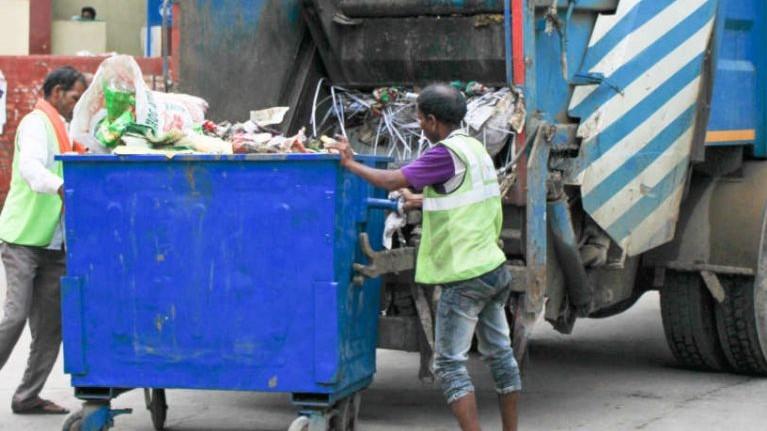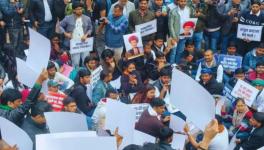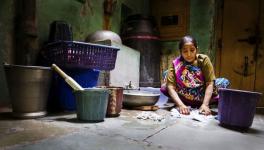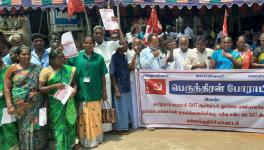Sanitation Workers Should Be Identified as Health Workers: Concerned Citizens Write Open Letter

Image Courtesy: India Spend
A group of eminent and concerned citizens have written an open letter to the ministers of the state and central governments and to the people of India, highlighting the role played by sanitation workers in the response to the COVID-19 pandemic. Hailing the sanitation workers, the letter states that this is the opportune time to identify them as frontline health workers, when the issues of sanitation and hygiene are particularly coming under the focus.
Further, instead of understanding the crucial contribution of sanitation workers in the society’s well being, often sanitation work has been associated with its casteist foundations and workers often discriminated against for the nature of their work. However, when public hygiene has assumed such significance, small tokens of appreciation have emerged. Commenting on the new found appreciation for sanitation workers, the letter states, “But it is also as if, quite suddenly, privileged people have discovered that it is human beings, of flesh and blood like themselves, who have been engaged in the business of cleaning up humanity’s trash all these generations.”
The need of the hour, however, is not such token gestures, but “the implementation of a set of concrete, practical proposals that will lend substance to our awakening and our understanding, and tie these together in a proper appreciation of the values of sanitation and justice, and their grounding in enlightened self-interest.”
The concerned citizens write that this can be realised through “our willingness to go far beyond the dispersed gestures of tokenism that we have witnessed.”
They have put forth a set of demands including mechanisation of sanitary work, minimum wage of at least Rs. 20,000, comprehensive health insurance for sanitation workers and their families and elimination of contractual work, among others. It is only through these measures and more that, the letter states, that this “opportunity to annihilate caste and untouchability, altogether, from our nation” can be realised.
The full body of the letter along with its signatories is produced below.
SANITATION, JUSTICE, AND SELF-INTEREST: AN OPEN LETTER ADDRESSED TO THE STATE AND SOCIETY
Dear Ministers of the Central and State Governments, and People of India,
This is a letter addressed to all organs of State and Society, to all of our fellow citizens, especially to those of us who are privileged by caste and class. It is written in a time of great national and global crisis, when the corona pandemic is upon us all. If the epidemic has unleashed many tragic forces, it has also - provided we are willing to be receptive - been an instructive tutor on various intimate aspects of our public and personal lives. One of these, surely, is the profoundly important nexus between the notions of sanitation, justice, and self-interest. While this is the larger subject motivating this letter, a more proximate trigger has been the reports we have all heard of sanitary workers being appreciated for their work in this time of collective emergency. These tokens of appreciation have mainly assumed the form of small amounts of money and food.
The appreciation is to be welcomed. But it is also as if, quite suddenly, privileged people have discovered that it is human beings, of flesh and blood like themselves, who have been engaged in the business of cleaning up humanity’s trash all these generations. Even so, and however dismal it may be, there is truth in the old proverb that it is better late than never. In this new-found discovery and appreciation might be the seeds of a new awakening.
The hope is that as a nation, perhaps we have, finally, understood the importance of public hygiene. If we wish it to become a feature of the nation, we have to go far beyond mere tokenism. We have to work and build on the understanding that hygiene and wellbeing are complementary, even identical, just as the tasks of sanitary workers and doctors are complementary, and their purposes identical. The realization of this understanding will depend upon our willingness to go far beyond the dispersed gestures of tokenism that we have witnessed. What is called for, rather, is the implementation of a set of concrete, practical proposals that will lend substance to our awakening and our understanding, and tie these together in a proper appreciation of the values of sanitation
and justice, and their grounding in enlightened self-interest. With this in mind, we suggest, as a first step, that we affirm the following as absolutely necessary.
1. Sanitary workers should be classified as health workers, along with doctors and nurses. This will, first and foremost, protect their dignity.
2. (a) All sanitary work should be mechanised. (b) No sanitary work will be contract labour. (c) A minimum wage, of at least Rs.20,000, should be implemented. (In a metropolitan centre like Chennai, Rs.20,000 for a household of 4 would be just about stringently adequate to secure some minimum necessities of life.) (d) There must be comprehensive health insurance for sanitary workers and their families. (e) They will be eligible for all allowances that are covered under the description of ‘hazardous work’. (f) All sanitary workers will be eligible for pension benefits.
3. Sanitary workers must be provided accommodation, just as the police are, for they both work at keeping citizens safe. Many work at night, so they should be provided safe transport to the site of work.
4. In time, sanitary workers shall come to play a supervisory role. All citizens will participate in keeping public spaces clean, they will separate their garbage, they will compost their bio-degradable waste locally. Sanitary workers will help citizens establish gardens, and help them grow fruits and vegetables with their compost.
5. Children of sanitary workers must get preferential admission to Kendriya Vidyalaya, Jawahar Navodaya Vidyalaya, and Sainik Schools.
The steps proposed above might seem like a social and cultural revolution, but they are no more than a product of the realization that the incalculable benefits of sanitation can be secured from a sensible perception of justice and self-interest being mutually reinforcing virtues. Schemes such as Smart City and Swachh Bharat can very easily finance these proposals. Now, they only need our resolve to see them through.
It is an indisputable fact that sanitary workers in India are overwhelmingly Dalits, and are in fact from ‘scavenging castes’. There have been many liberation movements, for instance the Bhim Yatra of 2012, organised by the Safai Karamchari Andolan, which was successful in liberating many thousands of sanitation workers from the shameful and socially imposed practice of cleaning human excreta, with a broom and a basket. While this is true, our letter addresses another issue altogether, namely the liberation of the ‘upper’ castes from an imprisoning net of their own making. The fear of transmission of the corona virus has presented us with an opportunity to not only emerge a clean and dignified nation, but to also break the caste transmission of sanitary work from mother to daughter, from father to son. We have been presented with an opportunity to annihilate caste and untouchability, altogether, from our nation. If we can accomplish this, we would have met the challenge of this virus with a response that will lift us from the depths to great heights.
We therefore appeal to all good people of conscience and common sense to come forward and to participate in a rebirth of this nation that is mediated by considerations of cleanliness, fairness, and practical wisdom.
Signatories: G. Israel, Shiva Shankar, S. Subramanian, Mari Marcel Thekaekara, Tathagata Sengupta, E. Asaithambi, A. Isaiah, Arul Ganesh, Romar Correa, Ritu Dewan, D. Jayaraj, Godfrey D’Lima, Dipankar, Abdul Matin, Rajeswari Sunder Rajan, Alok Laddha, Kanthi Swaroop, Aniruddha, Gita Ramaswamy, Dheeraj Singh, Muthulakshmi K, Ganga Parvathi, Karuppu Samy, Kamalakar Duvvur, Purandar Bhaduri, Paramjit Singh, K.V. Subrahmanyan, N. Usha Rani, Ronak Soni, Reva Yunus, Rahul Varman, Suresh Devasahayam, Hari Shankar, S. Anand, Prabha Appasamy, V. Geetha, Padmanabhan Ramaswamy, Supratik Chakraborty, Subhash Gatade, Devika Singh, Siddharth K J, D. Parthasarathy, Neeti Bhai, Ananth Shankar, Pramathanath Sastry, Sitaram Alladi, Bittu K R, Suvasish De, Maitreesh Ghatak, Nilanjan Dutta, Swadhin Pattanayak, Arul Shankar, Bindhulakshmi, Vijay Ravikumar, Sushmita Venu- gopalan, Madhusree Basu, Kinjal Banerjee, Arnab Priya Saha, R. Paramanantham, Esakkiraj, Boja Rajan, Prabu, Saravanan, Manivanan, Gowthamarajan, Annadurai, Boopathy, Arasi, Velmurugan, Yasika, Ulaganathan, Karthiga, Aditya Sharma, S. Akshay, Rohan Poojary, Daya Subramanian, Satish Deshpande, Kaushik Sunder Rajan, Ashwini Deshpande, Jayati Ghosh, A. Manu, Bobby Ezhuthachan, Sarada Natarajan, Aneesh Balakrishnan, Sudha Narayanan, Shishir Jha, Soumyajit Pramanick, Venkatesh Athreya, Vamsi Vakulabharanam, Anoushka Kurien, Epratha Sarathy, Kennedy Joseph, Madhusudhan Raman, N. Ramadas, Abhishek Kashyap, Akshay Sawant, Debangshu Mukherjee, Srividya Natarajan, Nigel Joseph, Alaka Basu, Sripad Motiram, Kaniska Singh, Devesh Khatarkar, Manav Khaire, Adwitee Roy, Pratik Roy, Girija Godbole, Pranjal Nayak, Shiva Thrishul, Disha Bhanot, Teesta Setalvad, Probal Dasgupta, Murali Srinivasan, Surekha Bhanot, Om Damani, Ranjit Roy, G. Ranjini, Prashant Kocherlakota, Aruna Burte, Niharika Banerjea, Sumita Beethi, S. Balakrishnan, Shraddha Chickerur, Jananie Kalyanaraman, Panchami Jose, Ishan Santra, Aniket Gaur, S. Pandikumar, A. Thangaperumal, Siva S, K. Suruliraj, Y. Srinivas Rao, Sayanti, Tejendra Pratap Gautam, Shrinivas Vangari, T. Vadivukkarasi, T. Rajammal, R. Mohanraj, Shyam, Arati, Samiksha, Kishan Pathak, Anjali James, Nimesh Mathew, Manas Arun Samant, Pratibha, Narendra, Kesu, Nagarathnam, Aakash, Murugan, Bharathidasan, Chitra, Senthil Babu, Gopinath S, Akash Bhattacharya, R. Ramanujam, Avipsha Das, Jayasree Subramanian, Vaibhav Vaish, Smarika Lulz, Tulsi Srinivasan, Kishore Darak, Anindya Hajra, Pratyay Gender Trust - Kolkata, Deepika Joshi, Deepa Vasudevan, Arundhati Dhuru, Sandeep Pandey, Sylvia Karpagam, Prabir Chatterjee, Swarupa Sakar, Rosamma Thomas, Satyendra Narayan Singh, and Sushruta Jadhav.
Get the latest reports & analysis with people's perspective on Protests, movements & deep analytical videos, discussions of the current affairs in your Telegram app. Subscribe to NewsClick's Telegram channel & get Real-Time updates on stories, as they get published on our website.
























